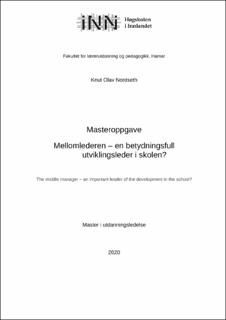| dc.contributor.author | Nordseth, Knut Olav | |
| dc.date.accessioned | 2020-12-30T17:38:02Z | |
| dc.date.available | 2020-12-30T17:38:02Z | |
| dc.date.issued | 2020 | |
| dc.identifier.uri | https://hdl.handle.net/11250/2721143 | |
| dc.description | Mastergradsoppgave i utdanningsledelse, Høgskolen i Innlandet, 2020. | en_US |
| dc.description.abstract | Norsk:
Bakgrunnen for tematikken i denne oppgaven er både de nasjonale og de internasjonale utdanningsforskerne sine funn som betrakter at skoleledelse er avgjørende for et vellykket forbedringsarbeid i skolen. Mellomlederrollen har et potensial til å være tett på pedagogisk praksis i skolen og således ha en sterk påvirkningskraft overfor forbedringsarbeidet og læreres profesjonsutvikling. Samtidig kan mellomlederen i skolen vurderes som en uutnyttet ressurs med langt større potensiale enn det han har i dag.
I tillegg til at både nasjonale og internasjonale utdanningsforskere vurderer skoleledelse og mellomlederrollen som betydningsfull, ligger det også politiske føringer fra Kunnskapsdepartementet som retter fokuset mot skoleledelse og lederteam. Med bakgrunn i både utdanningsforskning og politiske signaler er den overordnede problemstillingen i denne oppgaven: «Hvilke mønstre er det mellom skolens forbedringsarbeid og mellomlederens rolle?»
Problemstillingen er undersøkt gjennom to separate forskningsspørsmål. Disse er behandlet i to ulike artikler. Artikkel 1 er en kvalitativ undersøkelse som bygger på informasjon fra tre lærere i grunnskolen. Artikkel 2 er en kvantitativ undersøkelse som bygger på data fra FoU-prosjektet «Kultur for læring» hvor i overkant av 2200 lærere i grunnskolen i tidligere Hedmark Fylke, nå en del av Innlandet fylke, har bidratt med sine svar.
Hovedfunnet i oppgaven er at det er mønstre mellom skolens forbedringsarbeid og mellomlederens rolle. Først og fremst handler dette om at mellomlederen er tett på pedagogisk praksis, og at han har god kunnskap om læringsmiljøet i den enkelte gruppe. Dessuten viser funnene at mellomlederen har en avgjørende rolle ved å delta i lærernes profesjonelle læringsfellesskap. Mellomlederen kan ved å anvende sin kunnskap og kompetanse være en translatør som bygger en bro mellom forskningens teoretiske perspektiv og skolens pedagogiske praksis. Dersom mellomlederen får handlingsrom og det skapes en gjensidig forståelse for oppdraget som ligger i rollen, vil mellomlederen ha potensiale til å være en viktig utviklingsleder i skolen. | en_US |
| dc.description.abstract | English:
The background for the theme in this task is the results of research, both national and international, that conclude that school leaders are crucial for the successful implementation of improvements in schools. The role of mid-management has the potential to follow closely the pedagogical practice in school and therefore has a strong influence on the improvement process and the professional development of the teachers. At the same time the school middle managers are considered to be an under-utilized resource and have a far greater potential than today.
In addition to the fact that both national and international researchers consider the roles of both senior and mid-level school leaders to be important, there are clear political signals from the department of education that focus on school leaders and the team of leaders. Based on both educational research and political signals the main issue of this task is “What patterns exist between the school’s improvement processes and the role of middle-manager?”
The task comprises the investigation of two separate research questions. There are separate articles on each of these questions. The first article is a qualitative survey built on information from three elementary school teachers. The second article is a quantitative survey built on data from the FoU-project “Kultur for læring” where over 2200 elementary and secondary school teachers in Hedmark county, which is now a part of the new Innlandet county, have contributed with their answers.
The main finding of the task is that there are patterns between the school’s improvement processes and the role of middle managers. Primarily this is about the middle manager’s involvement in and influence on pedagogical practices and knowledge of the teaching environment in each separate student group. In addition, the results show that middle-mangers play a vital part by participating in the teacher’s professional pedagogical community. By applying his knowledge and competence, the middle manager can be a translator building a bridge between the theoretical perspective of research and the pedagogical practice of the school. If the middle manager is given the freedom to maneuver and there is a mutual understanding of the task that lies in his role, the middle manager will have the potential to be an important leader of the development in the school. | en_US |
| dc.language.iso | nob | en_US |
| dc.subject | MIU | en_US |
| dc.title | Mellomlederen – en betydningsfull utviklingsleder i skolen? | en_US |
| dc.title.alternative | The middle manager – an important leader of the development in the school? | en_US |
| dc.type | Master thesis | en_US |
| dc.source.pagenumber | 84 | en_US |
